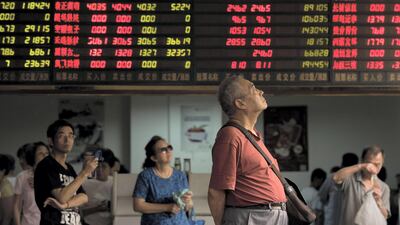The inclusion of Chinese stocks and bonds in various global indexes may not be a good news for stock and fixed income assets of other emerging markets as investors re-balance their holdings to reflect their exposure to Asia's biggest economy, the International Monetary Fund says.
Emerging market government bonds issuers could see an average reduction of allocations by $1 billion (Dh3.67bn) to $3bn each as benchmark-driven investors adjust their portfolios to include Chinese bonds, the international lender said in an analysis on its blog post.
"Investors may reduce purchases of other emerging-market assets as they re-balance their portfolios to reflect China’s inclusion," it said. "These effects could be larger for some countries, where benchmark-driven holdings constitute a significant amount of their foreign debt."
After years of anticipation, benchmark global bond indexes are finally incorporating China, drawing many investors - some for the first time - to the world's second biggest economic power house. In the past five years alone, foreign ownership of Chinese government bonds has quadrupled to almost 8 per cent. Ownership of onshore equities has also increased but remains low compared with other emerging markets. This trend of rising foreign ownership is likely to accelerate further, IMF noted.
Assets tracking the Bloomberg Barclays index could total $2 trillion to $2.5tn, according to analysts. Assuming an expected weighting of 6 per cent, China can expect to see an additional $150bn of inflows by 2020. Bloomberg Barclays Global Aggregate Index on April 1 began adding Chinese government and policy bank bonds over 20 months.
The milestone inclusion is expected to draw billions of foreign dollars into China’s $13 trillion bond market, the world’s third largest. Chinese government bonds are also on a “watchlist” of bonds to join FTSE Russell’s World Government Bond Index (WGBI), with a review set to take place in September, the index provider said.
The inclusions mark China's embarking on the next stage of its integration in global financial markets, which will attract foreign investment, improve liquidity and enhance governance, the IMF said.
"The news for other emerging markets may not be as good," the Washington-based lender said. "We can expect a further increase in the importance of China in the emerging market universe."
For China, the inclusion in global indexes is vastly significant.
Greater foreign investor participation may subject Chinese markets to greater scrutiny and stricter governance standards, the IMF said.
It is also expected to lead to improved market liquidity and a potentially broader range of instruments, including those for hedging foreign exchange risks, which would benefit both local and foreign investors, according to the IMF.


